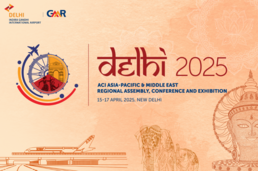
ICAO DGCA Conference: ACI Asia-Pacific Welcomes States’ Commitment to Strengthen Regional Cooperation on Critical Challenges for Recovery of Aviation Industry
- 2022-07-11
Airports Council International (ACI) Asia-Pacific has called for flexible regulatory policies, innovative procedures, greater efficiency and a better passenger experience as part of its long-term approach to help airports make a sustainable recovery.
At the ICAO’s 57th Conference of Directors General of Civil Aviation for Asia and Pacific Regions in Incheon, Republic of Korea, ACI Asia-Pacific has made several recommendations related to ACI’s approach to airports decarbonisation; need for responsive and flexible regulatory framework; adoption of One-Stop Security; addressing manpower crisis at airports; smooth operational recovery from pandemic; Role of APEX in aerodrome certification.
Mr. Stefano Baronci, Director General of ACI Asia-Pacific, said: "We are pleased that ICAO Member States have, to a large extent, have favourably considered our recommendations to further enhance airports’ role as engines of economic and social progress in a safe and sustainable manner. In particular, the Conference recommendations for States to include the Airport Carbon Accreditation and APEX in Safety in their National Aviation Plans is a strong incentive for ACI Asia-Pacific to continue to assist developing countries in building capacity consistently with the ICAO Policy of No Country Left behind.”
As borders and economies begin to reopen, more flexible regulatory policies and innovative solutions are needed to drive air travel. Building on the positive outcome of the Conference, ACI Asia-Pacific expects regulators in the Asia-Pacific Region and ICAO to act in cooperation with the industry stakeholders, and it is paramount to do so with global harmonisation if we want the air transport industry to continue to be a key contributor to our economic recovery.
“The way towards recovery in Asia-Pacific is still long and challenging but States have unequivocally committed to strengthen regional cooperation, including in the areas of reviving air travel, enhancing manpower, improving operations to ensure a smooth traveller experience, aviation safety and sustainability. The upcoming 41st ICAO Assembly in September will be a critical juncture for building consensus at global level on important initiatives related to the decarbonisation of the sector and harmonisation of health measures.” Mr. Baronci added.
Action items arising from the 57th Conference: Key Highlights
The Role of APEX in Safety on Aerodrome Certification: The Conference urged States, especially those which have not certified all of their international aerodromes, to include APEX in Safety in their National Aviation Safety Plan. APEX in Safety is a peer assessment programme whereby voluntary aerodrome safety and operations professionals are invited to conduct safety reviews of airports. The reviews have proved helpful for airports to improve safety compliance.
Increasing the adoption of One-stop Security: The Conference encouraged governments to consider inputs and recommendations provided by airports and airlines when assessing opportunities for One-stop Security (OSS). OSS has been discussed for many years and the potential benefits that it can bring to the security and efficiency of the entire air transport industry are widely acknowledged. However, the implementation of OSS is still limited worldwide, especially in the Asia-Pacific region.
Airports Need a Responsive & Flexible Regulatory Framework: The Conference encouraged the States/Administration to support the activities and tasks of ICAO’s Airport Economics and Air Navigation Services Panel (AEP-ANSEP) to conduct a general review of the ICAO policies on charges contained in Doc 9082, including the assessment of its ongoing relevance and responsiveness to industry changes and to ensure representation and active participation of Asia-Pacific States/Administrations in the Panel.
Ensuring Smooth Operational Recovery from Pandemic: The Conference recommended that:
- ICAO to progress as a priority the High-Level Conference on COVID (HLCC) 2021 recommendations and actions aimed at developing a crisis response framework for future health crises that draws on the recommendations and guidance and advice developed by Council's Aviation Recovery Task Force (CART);
- States enhance the use of digital health platforms, where applicable, and simplify the processes by removing the need for airlines to check physical documents at check-in;
- Government agencies in individual States coordinate and collaborate among themselves to provide a single platform for the collection of comprehensive information about passengers and issuance of digital notification of approval to travel.
ACI’s contribution to Airport's Decarbonisation:The Conference urged States/Administrations to support the 41st Session of the ICAO Assembly in its deliberations on Long Term Aspirational Goal (LTAG). In respect to this, the Conference encouraged close discussions among Asia- Pacific States/Administrations to ensure the interests of the region are reflected in any decision on an LTAG.
The Conference also urged States/Administrations to support airport operators in implementing de-carbonisation strategies and encouraged States/Administrations to consider using ACI’s Airport Carbon and Emissions Reporting Tool (ACERT) and participating in ACI’s Airport Carbon Accreditation and including them within their State Action Plans.
Manpower Shortage at Airports as an Impediment to Traffic Recovery: The Conference acknowledged the challenge of manpower shortages of the aviation ecosystem and urged governments to work closely with industry stakeholders to alleviate this problem in the short-and medium-term as well as to develop a roadmap to make airport employment attractive and competitive in the long-term; and to ensure proper staffing at processing points such as immigration, customs and security.








